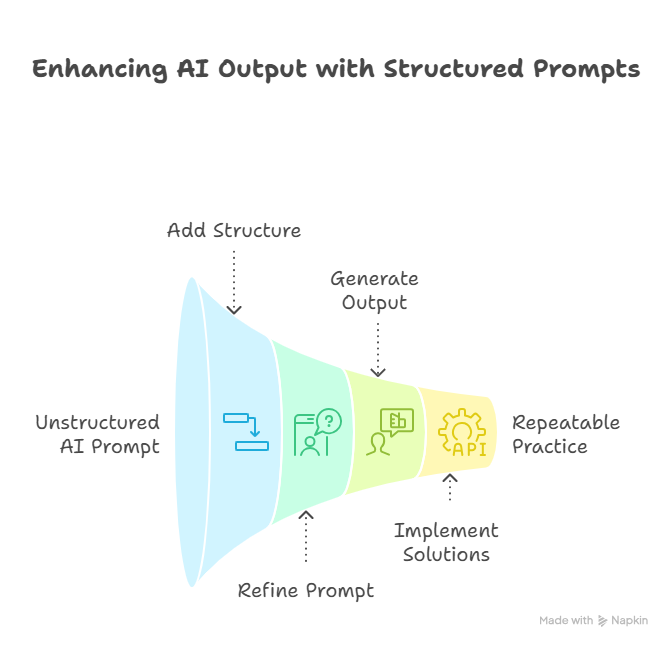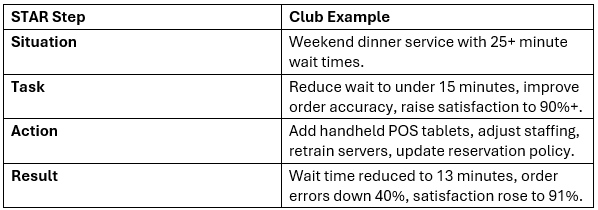
This article is part of our nine-part series on AI prompt frameworks for private clubs, adapted from research developed by Khizer Abbas and the team at Superhuman AI. Each framework is designed to help managers turn AI into a practical tool for solving everyday challenges inside clubs.
Restaurant service issues remain one of the most common sources of member complaints. Members may forgive an occasional scheduling mix-up or a small facility issue, but when dining consistently falls short—whether due to slow service, inconsistent food quality, or unclear reservation policies—it quickly impacts satisfaction and retention. These moments shape the member experience, and they deserve structured attention.
That’s where the STAR Framework comes in. Unlike informal debriefs or quick fixes, STAR (Situation, Task, Action, Result) gives managers a repeatable process to convert complaints into concrete improvements. And because this is a prompting framework, its real power comes when you feed STAR into an AI tool. A well-crafted prompt produces sharper, more actionable ideas than a generic request like “Help us improve service.” The structure is what pulls useful insights out of the model.
Situation
XYZ Club’s dining room faced a familiar issue: during weekend dinners, members were waiting more than 25 minutes for food orders. Complaints piled up, and some members began dining outside the club.
Task
Management set clear goals—bring average wait times under 15 minutes, improve order accuracy, and raise satisfaction scores above 90% in the next member survey.
Action
- Analyzed the workflow to identify bottlenecks between servers and the kitchen.
- Introduced handheld POS tablets to transmit orders instantly.
- Scheduled extra staff during peak hours using analytics on dining patterns.
- Retrained staff on proactive service, member recognition, and communication.
- Adjusted reservation policies to prevent overbooking.
Result
Within two months:
- Average wait times dropped from 25 to 13 minutes.
- Incorrect order complaints decreased by 40%.
- Dining satisfaction rose from 76% to 91%.
- Members reported choosing the club over outside restaurants again.
This structured review turned frustration into progress—and positioned dining as a renewed strength of the club.

When managers type into an AI tool without structure, they usually get surface-level advice—“add more staff,” “improve training.” Helpful, but not enough. By building the Situation, Task, Action, and Result into the prompt, you’re forcing the model to think step by step. The outputs become grounded, measurable, and specific to the club environment. The better the prompt, the better the output.
This also creates a habit for staff reviews. Instead of an open-ended discussion after a service failure, managers can bring a STAR prompt to the table, run it through AI, and get a list of solutions paired with measurable benchmarks. It becomes a repeatable practice rather than a one-time brainstorm.
Below is a sample STAR prompt you can use directly in ChatGPT, Claude, Copilot, or Gemini. Notice how it explicitly walks the model through Situation, Task, Action, and Result:
“You are an experienced Food & Beverage Director who has led service improvements at several private clubs. You have a track record of reducing member complaints and improving survey scores through operational reviews and staff development.
Situation:Analyze the following member feedback and dining reports from XYZ Club. Complaints focus on slow weekend service, inconsistent food quality, and unclear reservation policies.
Task:Define the improvement goals for XYZ Club, including measurable KPIs such as reduced wait times, improved order accuracy, and higher member satisfaction scores.
Action:Recommend three to five changes XYZ Club should implement. These could include technology upgrades (POS/tablet ordering), staff training initiatives, or updates to reservation policies. Be specific to the private club environment.
Result:Explain what success will look like and suggest realistic benchmarks to track over the next quarter. Include before-and-after measures (e.g., average wait time, order accuracy %, survey results).”
For even sharper recommendations, managers should attach:
- Member dining feedback summaries or survey data.
- POS transaction logs or kitchen ticket times.
- Reservation system reports (overbooking, cancellations, table turnover).
- Staff schedules and labor reports during peak service.
These documents give AI the raw material to generate tailored, practical solutions instead of generic advice.
Here’s a simple way to visualize STAR for club service reviews. Managers can use this table during debriefs or as an attachment when prompting AI:

This format makes it easy to see what was done and why—and to share results with boards, committees, or staff.
The STAR Framework helps clubs close the loop between member feedback and operational improvement. By structuring reviews around Situation, Task, Action, and Result—and embedding that structure into prompts—managers can turn complaints into wins. Successful prompts lead to better outputs, and better outputs lead to better member experiences.
Credit: This article is part of a nine-part series on AI prompting frameworks for private clubs, created with insights from Khizer Abbas and Superhuman AI.